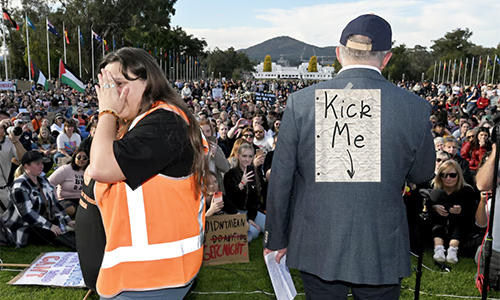There was a cranky call doing the rounds online last week suggesting veterans should turn their backs on Sir Keir Starmer as he laid a Remembrance Sunday wreath.
Naturally I opposed it, alongside many other conservative-leaning commentators. We argued that honouring our war dead is something we should want all the main strands of political opinion to unite behind.
More than one in five people who voted at the general election in July were unrepresented
Of course, this scheme didn’t happen: the vast majority of armed forces veterans would never politicise a service of remembrance for fallen colleagues in that way.
So all the main party leaders joined together to lay wreaths at the Cenotaph and protect an important non-partisan and near-universal social norm, right? Wrong.
Because two important parties were expressly prevented from having their leaders lay wreaths by virtue of the government choosing to maintain an obscure protocol drawn up 40 years ago.
Nigel Farage of Reform, which won four million votes and five seats at the election and Carla Denyer, co-leader of the Greens (four MPs and almost two million votes), were only permitted to watch proceedings from a nearby balcony.
The 1984 protocol, which was also invoked in 2015 to prevent Ukip from laying a wreath, says that a party must have at least six MPs to take part in the ceremony. The Democratic Unionist party, which like Reform has five MPs, was allowed to lay one because of a get-out clause stipulating that the leading party in every constituent country of the Union can do so even if they are short of the six-seat threshold.
In other words, the government of the United Kingdom has chosen to shut out parties with millions of voters and elected MPs from participating fully in this solemn national moment. Ministers could have changed the rules but decided not to. Preventing two challenger parties to Labour from graduating to the big league of state occasions is apparently more important than nurturing the spirit of non-partisanship. That meant that more than one in five people who voted at the general election in July were unrepresented in the long procession of politicians laying wreaths.
Naturally there were sour quips doing the rounds suggesting that Farage in particular could have chosen to lay a wreath in his Clacton constituency instead of attending the national act of remembrance. This was yet another sign of an establishment in spiteful denial of his stature as a leading national and indeed international political figure.
While Farage did not himself complain about being kept on the sidelines, many of his supporters did, including Reform deputy leader Richard Tice who branded it ‘a shameful stitch-up’.
Tice is right. The old duopoly can try and deny it as much as they like, but we are living in the era of multi-party democracy now, even under a voting system which creates formidable barriers to entry for challenger outfits.
The government has behaved little better than the right-wing social media cranks who wished to insult Starmer at the ceremony simply because they detest his politics.









